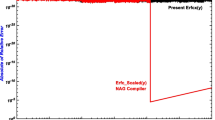Abstract
Today's floating point implementations of elementary transcendental functions are usually very accurate. However, with few exceptions, the actual accuracy is not known. In the present paper we describe a rigorous, accurate, fast and portable implementation of the elementary standard functions based on some existing approximate standard functions. The scheme is outlined for IEEE 754, but not difficult to adapt to other floating point formats. A Matlab implementation is available on the net. Accuracy of the proposed algorithms can be rigorously estimated. As an example we prove that the relative accuracy of the exponential function is better than 2.07 eps in a slightly reduced argument range (eps denoting the relative rounding error unit). Otherwise, extensive computational tests suggest for all elementary functions and all suitable arguments an accuracy better than about 3 eps.
Similar content being viewed by others
REFERENCES
O. Aberth and M. Schaefer, Precise computation using range arithmetic, via C++, ACM Trans. Math. Softw., 18:4 (1992), pp. 481-491.
M. Abramowitz and I. Stegun, Handbook of Mathematical Functions, Dover, New York, 1968.
N. C. Börsken, Komplexe Kreis-Standardfunktionen, Diplomarbeit, Freiburger Intervall-Ber. 78/2, Inst. für Angewandte Mathematik, Universität Freiburg, 1978.
K. D. Braune, Hochgenaue Standardfunktionen f¨ur reelle und komplexe Punkte und Intervalle in beliebigen Gleitpunktrastern, Dissertation, Universität Karlsruhe, 1987.
R. P. Brent, A Fortran multiple-precision arithmetic package, Tech. Report, Department of Computer Science, Australian National University, Canberra, 1975.
R. P. Brent, J. A. Hooper, and J. M. Yohe, An AUGMENT interface for Brent's multiple precision arithmetic package, ACM Trans. Math. Software, 6:2 (1980), pp. 204-217.
B. M. Brown, D. K. R. McCormack, and A. Zettl, On the existence of an eigenvalue below the essential spectrum, Proc. R. Soc. Lond., 455 (1999), pp. 2229-2234.
J.-P. Eckmann and P. Wittwer, Computer Methods and Borel Summability Applied to Feigenbaum's Equation, Vol. 227 of Lecture Notes in Physics, Springer-Verlag, Berlin, 1985.
T. C. Hales, Cannonballs and honeycombs, Notices Amer. Math. Soc., 47:4 (2000), pp. 440-449.
N. J. Higham, Accuracy and Stability of Numerical Algorithms, SIAM, Philadelphia, PA, 1996.
O. Holzmann, B. Lang, and H. Schütt, Newton's constant of gravitation and verified numerical quadrature, Reliable Computing, 2:3 (1996), pp. 229-239.
IEEE Standard for Binary Floating-Point Arithmetic, ANSI/IEEE Standard 754-1985, Institute of Electrical and Electronics Engineers, New York, 1985.
R. Klatte, U. Kulisch, M. Neaga, D. Ratz, and Ch. Ullrich, PASCAL-XSC-Sprachbeschreibung mit Beispielen, Springer-Verlag, Berlin, 1991.
R. Klatte, U. Kulisch, A. Wiethoff, C. Lawo, and M. Rauch, C-XSC A C++ Class Library for Extended Scientific Computing, Springer-Verlag, Berlin, 1993.
W. Krämer, Inverse Standardfunktionen für reelle und komplexe Intervallargumente mit a priori Fehlerabschätzung für beliebige Datenformate, Dissertation, Universität Karlsruhe, 1987.
W. Krämer, Die Berechnung von Standardfunktionen in Rechenanlagen, Jahrb.Überbl. Math. 1992, 1992, pp. 97-115.
B. Lang, Verified quadrature in determining Newton's constant of gravitation, J. Universal Computer Science, 4:1 (1998), pp. 16-24.
MATLAB User's Guide, Version 5, The MathWorks Inc., Natick, MA, 1997.
J. M. Muller, Elementary Functions, Algorithms and Implementation, Birkhäuser, Boston, MA, 1997.
M. Payne and R. Hanek, Radian reduction for trigonometric functions, SIGNUM Newsletter, 18 (1983), pp. 19-24.
S. M. Rump, Fast and parallel interval arithmetic. BIT, 39:3 (1999), pp. 539-560.
S. M. Rump, INTLAB-INTerval LABoratory, in Developments in Reliable Computing, T. Csendes, ed., Kluwer Academic Publishers, Dordrecht, 1999, pp. 77-104. http://www.ti3.tu-harburg.de/rump/ intlab/index.html.
P. T. P. Tang, Table-lookup algorithms for elementary functions and their error analysis, Tech. Report MCS-P194-1190, Argonne National Lab., January 1991.
W. F. Wong and E. Goto, Fast hardware-based algorithms for elementary function computations, in Proc. International Symposium on Supercomputing, Kyushu University Press, Fukuoka, Japan, 1991, pp. 56-65.
Author information
Authors and Affiliations
Rights and permissions
About this article
Cite this article
Rump, S.M. Rigorous and Portable Standard Functions. BIT Numerical Mathematics 41, 540–562 (2001). https://doi.org/10.1023/A:1021971313412
Issue Date:
DOI: https://doi.org/10.1023/A:1021971313412




